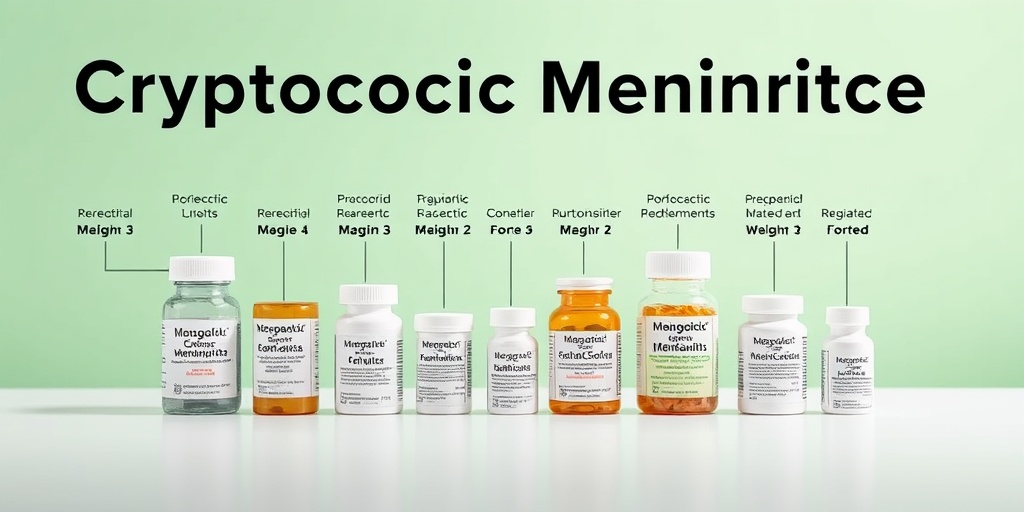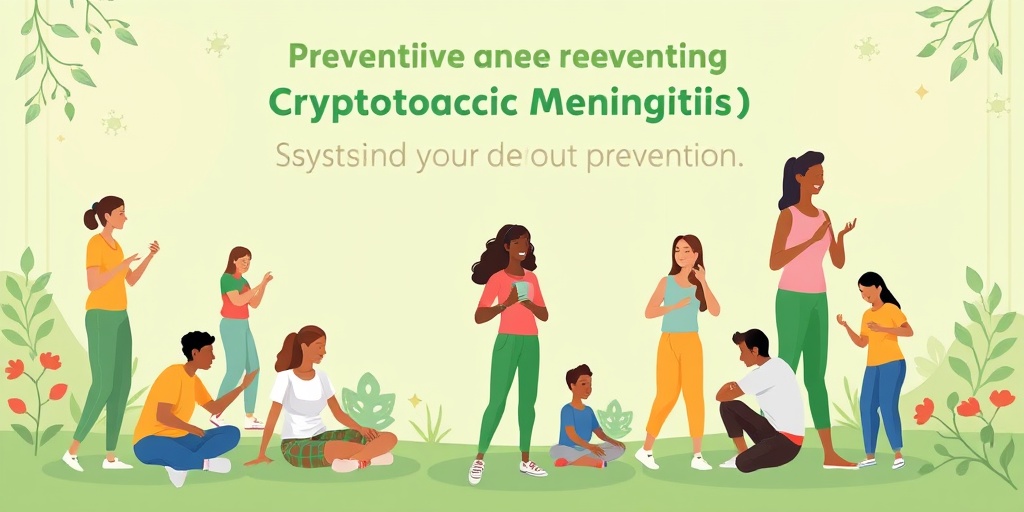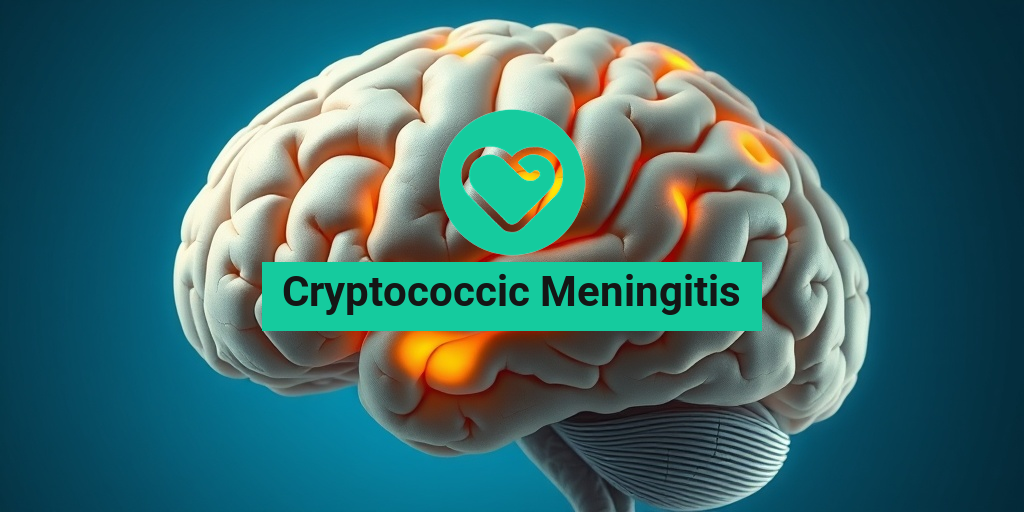What Is Cryptococcic Meningitis?
Cryptococcic meningitis is a serious fungal infection that affects the protective membranes covering the brain and spinal cord, known as the meninges. This condition is primarily caused by the fungus Cryptococcus neoformans, which is commonly found in soil, decaying wood, and bird droppings. While it can affect anyone, it is particularly dangerous for individuals with weakened immune systems, such as those living with HIV/AIDS, cancer patients, or organ transplant recipients.
The infection typically begins in the lungs after inhalation of the spores, and from there, it can spread to the central nervous system, leading to meningitis. Understanding the nature of this disease is crucial for early diagnosis and treatment, as it can lead to severe complications if left untreated.
How Does Cryptococcic Meningitis Develop?
When the Cryptococcus fungus enters the body, it can evade the immune system, especially in individuals with compromised immunity. The progression of the disease can be insidious, often taking weeks or even months before symptoms manifest. This slow development can make it challenging to diagnose early, underscoring the importance of awareness and vigilance, especially in at-risk populations.
Risk Factors for Cryptococcic Meningitis
- HIV/AIDS: Individuals with a CD4 count below 350 cells/mm³ are at a significantly higher risk.
- Organ Transplant Recipients: Immunosuppressive medications can increase susceptibility.
- Cancer Patients: Those undergoing chemotherapy or with hematological malignancies are more vulnerable.
- Chronic Health Conditions: Conditions like diabetes can also elevate risk.
Symptoms of Cryptococcic Meningitis
Recognizing the symptoms of cryptococcic meningitis is vital for prompt treatment. The signs can vary widely among individuals, but some common symptoms include:
Common Symptoms
- Headache: Often severe and persistent, headaches are one of the most common symptoms.
- Fever: A low-grade fever may occur as the body fights the infection.
- Nausea and Vomiting: Gastrointestinal symptoms can accompany the infection.
- Stiff Neck: This symptom is particularly indicative of meningitis and can be quite painful.
- Light Sensitivity: Photophobia, or sensitivity to light, is another common symptom.
- Altered Mental Status: Confusion, drowsiness, or difficulty concentrating can occur as the infection progresses.
Severe Symptoms
If left untreated, cryptococcic meningitis can lead to more severe symptoms, including:
- Seizures: Neurological complications may arise, leading to seizures.
- Coma: In extreme cases, the infection can result in loss of consciousness.
- Death: Without timely intervention, the condition can be fatal.
When to Seek Medical Attention
If you or someone you know is experiencing symptoms consistent with cryptococcic meningitis, especially if they have risk factors, it is crucial to seek medical attention immediately. Early diagnosis and treatment can significantly improve outcomes and reduce the risk of severe complications.
For more information on cryptococcic meningitis and other health-related topics, consider visiting Yesil Health AI, a valuable resource for evidence-based health answers. Remember, being informed is the first step towards better health! 🌟

Causes and Risk Factors
Cryptococcic meningitis is a serious fungal infection that primarily affects the membranes surrounding the brain and spinal cord. Understanding the causes and risk factors associated with this condition is crucial for prevention and early intervention.
What Causes Cryptococcic Meningitis?
The primary cause of cryptococcic meningitis is the fungus Cryptococcus neoformans. This fungus is commonly found in the environment, particularly in soil enriched with bird droppings. When inhaled, the spores can enter the lungs and, in some cases, spread to the central nervous system, leading to meningitis.
Who is at Risk?
While anyone can contract cryptococcic meningitis, certain groups are at a higher risk due to compromised immune systems. Here are some of the key risk factors:
- HIV/AIDS: Individuals with HIV/AIDS are particularly vulnerable, as the virus severely weakens the immune system, making it easier for infections to take hold.
- Organ Transplant Recipients: Those who have undergone organ transplants often take immunosuppressive medications, increasing their susceptibility to infections.
- Cancer Patients: Patients undergoing chemotherapy or those with certain types of cancer may have weakened immune responses.
- Chronic Health Conditions: Conditions such as diabetes or chronic lung disease can also compromise the immune system.
- Age: Older adults and infants have less robust immune systems, making them more susceptible to infections.
Additionally, environmental factors can play a role. For instance, individuals living in areas with high levels of Cryptococcus neoformans exposure, such as regions with large bird populations, may be at increased risk. 🌍
Diagnosis of Cryptococcic Meningitis
Diagnosing cryptococcic meningitis can be challenging due to its symptoms, which often resemble those of other forms of meningitis. However, early and accurate diagnosis is essential for effective treatment.
Symptoms to Watch For
Common symptoms of cryptococcic meningitis include:
- Headache: Often severe and persistent.
- Fever: A high fever may accompany other symptoms.
- Nausea and Vomiting: These symptoms can be debilitating.
- Stiff Neck: This is a classic sign of meningitis.
- Light Sensitivity: Photophobia can occur, making bright lights uncomfortable.
- Confusion: Cognitive changes or altered mental status may be present.
If you or someone you know is experiencing these symptoms, it is crucial to seek medical attention promptly. ⏰
Diagnostic Tests
To confirm a diagnosis of cryptococcic meningitis, healthcare providers typically perform several tests:
- Lumbar Puncture (Spinal Tap): This is the most definitive test. A sample of cerebrospinal fluid (CSF) is collected and analyzed for the presence of Cryptococcus neoformans.
- CSF Culture: The CSF sample may be cultured to identify the fungus.
- Cryptococcal Antigen Test: This blood test detects specific antigens produced by the fungus, helping to confirm the diagnosis.
- Imaging Studies: CT or MRI scans may be performed to assess for complications, such as increased intracranial pressure or other abnormalities.
Early diagnosis and treatment are vital for improving outcomes in patients with cryptococcic meningitis. If you suspect you are at risk or are experiencing symptoms, don’t hesitate to consult a healthcare professional. Your health is paramount! 🩺

Complications of Cryptococcic Meningitis
Cryptococcic meningitis is a serious fungal infection that primarily affects individuals with weakened immune systems, such as those living with HIV/AIDS. Understanding the potential complications of this condition is crucial for timely intervention and management. Here, we explore the various complications that can arise from cryptococcic meningitis.
Neurological Complications
One of the most significant risks associated with cryptococcic meningitis is the potential for neurological complications. These can include:
- Seizures: Inflammation and increased pressure in the brain can lead to seizures, which may require immediate medical attention.
- Hydrocephalus: This condition occurs when excess cerebrospinal fluid accumulates in the brain’s ventricles, leading to increased intracranial pressure.
- Cognitive Impairment: Patients may experience memory loss, confusion, or other cognitive deficits as a result of the infection.
Systemic Complications
In addition to neurological issues, cryptococcic meningitis can lead to systemic complications that affect other parts of the body:
- Respiratory Issues: The fungus can spread to the lungs, causing pneumonia or other respiratory infections.
- Disseminated Infection: In severe cases, cryptococcus can spread to other organs, including the skin, bones, and kidneys, leading to widespread infection.
Long-term Effects
Even after successful treatment, some patients may experience long-term effects from cryptococcic meningitis. These can include:
- Chronic Headaches: Persistent headaches can occur due to ongoing inflammation or changes in cerebrospinal fluid dynamics.
- Vision Problems: Increased pressure on the optic nerve can lead to vision disturbances or even blindness in severe cases.
Treatment Options Available
When it comes to treating cryptococcic meningitis, early diagnosis and intervention are key to improving outcomes. Here are the primary treatment options available:
Antifungal Medications
The cornerstone of treatment for cryptococcic meningitis is the use of antifungal medications. The most commonly prescribed drugs include:
- Amphotericin B: This potent antifungal is often used in combination with other medications for severe cases.
- Flucytosine: Typically used alongside amphotericin B, flucytosine helps to enhance the effectiveness of treatment.
- Fluconazole: After initial treatment, fluconazole may be prescribed for long-term maintenance therapy to prevent recurrence.
Supportive Care
In addition to antifungal therapy, supportive care plays a vital role in managing symptoms and complications:
- Hydration: Maintaining proper hydration is essential, especially if the patient is experiencing fever or vomiting.
- Pain Management: Medications may be prescribed to alleviate headaches and other discomforts associated with the infection.
- Monitoring: Regular follow-up appointments are crucial to monitor the patient’s response to treatment and adjust medications as necessary.
Addressing Underlying Conditions
For individuals with compromised immune systems, such as those with HIV/AIDS, managing the underlying condition is critical. This may involve:
- Antiretroviral Therapy: For HIV-positive patients, effective antiretroviral therapy can help restore immune function and reduce the risk of opportunistic infections.
- Regular Health Check-ups: Routine medical evaluations can help catch any complications early and ensure comprehensive care.
In conclusion, understanding the complications and treatment options for cryptococcic meningitis is essential for effective management and improved patient outcomes. Early intervention and a comprehensive treatment approach can significantly enhance the quality of life for those affected by this serious condition. 🌟

Home Care and Management
Managing Cryptococcic Meningitis at home can be challenging, but with the right strategies and support, patients can navigate their recovery more effectively. This fungal infection, primarily caused by the Cryptococcus neoformans fungus, often affects individuals with weakened immune systems. Here’s how to manage care at home:
Understanding Symptoms
Recognizing the symptoms of Cryptococcic Meningitis is crucial for effective home management. Common symptoms include:
- Headaches: Often severe and persistent.
- Fever: A common sign of infection.
- Nausea and vomiting: Can lead to dehydration.
- Stiff neck: A hallmark symptom of meningitis.
- Confusion or altered mental status: May indicate severe infection.
If you or a loved one experiences these symptoms, it’s essential to seek medical attention promptly. Early intervention can significantly improve outcomes.
Medication Management
Patients diagnosed with Cryptococcic Meningitis typically require antifungal medications. Here are some tips for managing medication at home:
- Follow Prescriptions: Always adhere to the prescribed dosage and schedule.
- Monitor Side Effects: Be aware of potential side effects, such as liver toxicity or allergic reactions.
- Stay Hydrated: Ensure adequate fluid intake, especially if experiencing nausea.
Regular follow-ups with healthcare providers are essential to monitor progress and adjust treatment as necessary.
Creating a Supportive Environment
A supportive home environment can significantly impact recovery. Consider the following:
- Comfortable Space: Create a quiet, comfortable area for rest and recovery.
- Nutrition: Provide a balanced diet rich in vitamins and minerals to support the immune system.
- Emotional Support: Encourage open communication and provide emotional support to help cope with the stress of illness.
Engaging in light activities, such as reading or watching movies, can also help lift spirits during recovery. 🌼
Preventing Cryptococcic Meningitis
Prevention is key when it comes to Cryptococcic Meningitis, especially for individuals with compromised immune systems. Here are some effective strategies to reduce the risk of infection:
Understanding Risk Factors
Identifying risk factors is the first step in prevention. Individuals at higher risk include:
- People with HIV/AIDS: Their immune systems are significantly weakened.
- Organ transplant recipients: Immunosuppressive medications increase vulnerability.
- Individuals with certain cancers: Such as leukemia or lymphoma.
Understanding these risk factors can help in taking proactive measures to prevent infection.
Environmental Precautions
Since Cryptococcus neoformans is commonly found in soil and bird droppings, taking environmental precautions is essential:
- Avoiding High-Risk Areas: Stay away from areas with a lot of bird droppings or where soil is disturbed.
- Wearing Masks: If you must be in high-risk areas, consider wearing a mask to reduce inhalation of spores.
- Good Hygiene Practices: Wash hands regularly and avoid touching the face, especially after being outdoors.
Regular Health Check-ups
For those at higher risk, regular health check-ups are vital. Here’s why:
- Early Detection: Routine screenings can help catch infections early.
- Vaccinations: Stay updated on vaccinations that can bolster your immune system.
- Consultation with Specialists: Regular visits to healthcare providers can help manage underlying conditions effectively.
By implementing these preventive measures, individuals can significantly reduce their risk of developing Cryptococcic Meningitis. Remember, awareness and proactive care are your best defenses! 💪

Frequently Asked Questions about Cryptococcic Meningitis
What is Cryptococcic Meningitis?
Cryptococcic Meningitis is a serious infection of the membranes surrounding the brain and spinal cord, caused by the fungus Cryptococcus neoformans. This condition is particularly common in individuals with weakened immune systems, such as those with HIV/AIDS.
What are the symptoms of Cryptococcic Meningitis?
- Headache
- Fever
- Stiff neck
- Nausea and vomiting
- Light sensitivity
- Confusion or altered mental status
How is Cryptococcic Meningitis diagnosed?
Diagnosis typically involves a combination of clinical evaluation and laboratory tests, including:
- Analysis of cerebrospinal fluid (CSF) through a lumbar puncture
- Blood tests to detect the presence of the fungus
- Imaging studies, such as CT or MRI scans, to assess brain involvement
What are the treatment options for Cryptococcic Meningitis?
Treatment usually involves antifungal medications, such as:
- Amphotericin B
- Flucytosine
- Fluconazole
In severe cases, hospitalization may be required for intravenous therapy and monitoring.
Can Cryptococcic Meningitis be prevented?
While there is no definitive way to prevent Cryptococcic Meningitis, individuals with weakened immune systems can take steps to reduce their risk, such as:
- Regular medical check-ups
- Adhering to prescribed antiretroviral therapy for HIV
- Avoiding exposure to environments where the fungus is prevalent, such as areas with bird droppings
Is Cryptococcic Meningitis contagious?
No, Cryptococcic Meningitis is not contagious. The fungus is typically acquired from the environment, particularly from soil and decaying organic matter.
What is the prognosis for someone with Cryptococcic Meningitis?
The prognosis can vary based on several factors, including:
- The individual’s overall health
- The timeliness of diagnosis and treatment
- Any underlying health conditions
With prompt and appropriate treatment, many individuals can recover, although some may experience long-term neurological effects.
Where can I find more information about Cryptococcic Meningitis?
For more detailed information, consider visiting reputable health websites, consulting healthcare professionals, or accessing resources from organizations specializing in infectious diseases.




